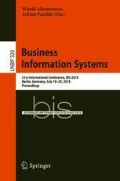Abstract
With the aim of meeting new technological and social requirements, nearly all companies are facing the so-called digital transformation. A starting point to respond to the changing demands is to improve the company’s ability to operate flexibly and, thus, increase its agility. Thereby, with this paper, we contribute to the ongoing discussion on changing corporate organizational structures. We used a three-stage study design to provide insights on the question of whether agility is a prerequisite or a consequence of the digital transformation. In addition to a literature analysis, we present the results of focus group interviews with managers of selected enterprises.
Access this chapter
Tax calculation will be finalised at checkout
Purchases are for personal use only
References
Bajer, J.: Digital transformation needs the human touch. Strateg. HR Rev. 16, 91–92 (2017)
Mathrani, S., Mathrani, A., Viehland, D.: Using enterprise systems to realize digital business strategies. J. Enterp. Inf. Manag. 26, 363–386 (2013)
Bley, K., Leyh, C., Schäffer, T.: Digitization of German enterprises in the production sector – do they know how “digitized” they are? In: Proceedings of the 22nd Americas Conference on Information Systems, AMCIS 2016 (2016)
Ludwig, T., Kotthaus, C., Stein, M., Durt, H., Kurz, C., Wenz, J., Doublet, T., Becker, M., Pipek, V., Wulf, V.: Arbeiten im mittelstand 4.0 – KMU im spannungsfeld des digitalen wandels. HMD Prax. Wirtsch. 53, 71–86 (2016)
Urbach, N., Ahlemann, F.: Der Wissensarbeitsplatz der Zukunft: Trends, Herausforderungen und Implikationen für das strategische IT-Management. HMD Prax. Wirtsch. 53, 16–28 (2016)
European Union: Commission Recommendation of 6th May 2003 concerning the definition of micro, small and medium-sized enterprises. Off. J. Eur. Union 20th May 2003. (2003/361/EC), pp. 36–41 (2003)
Lindner, D., Ludwig, T., Amberg, M.: Arbeit 4.0 – Konzepte für eine neue Arbeitsgestaltung in KMU. HMD Praxis Der Wirtschaftsinformatik 6(1), 17 (2018)
Arbussa, A., Bikfalvi, A., Marquès, P.: Strategic agility-driven business model renewal: the case of an SME. Manag. Decis. 55, 271–293 (2017)
Branicki, L.J., Sullivan-Taylor, B., Livschitz, S.R.: How entrepreneurial resilience generates resilient SMEs. Int. J. Entrep. Behav. Res. (2017)
Lindner, D., Ott, M., Leyh, C.: Der digitale Arbeitsplatz – KMU zwischen Tradition und Wandel. HMD Prax. Wirtsch. 54, 900–916 (2017)
Denning, S.: The next frontier for agile: strategic management. Strategy Leadersh. 45, 12–18 (2017)
Beaumont, M., Thuriaux-Alemán, B., Prasad, P., Hatton, C.: Using agile approaches for breakthrough product innovation. Strategy Leadersh. 45, 19–25 (2017)
Petry, T.: Digital Leadership: Erfolgreiches Führen in Zeiten der Digital Economy. Haufe Gruppe, Freiburg München Stuttgart (2016)
Martensen, M., Ryschka, S., Blesik, T., Bick, M.: Collaboration in the consulting industry: analyzing differences in the professional use of social software. Bus. Process Manag. J. 22, 693–711 (2016)
Schrauzer, S.: Computerisierung in der globalen softwareentwicklung – Eine arbeitsmethodische betrachtung. HMD Prax. Wirtsch. 53, 42–54 (2016)
Fettke, P.: State-of-the-art des state-of-the-art: eine untersuchung der forschungsmethode “Review” innerhalb der Wirtschaftsinformatik. Wirtschaftsinformatik 48, (2006)
Mayring, P.: Qualitative Inhaltsanalyse. In: Mey, G., Mruck, K. (eds.) Handbuch Qualitative Forschung in der Psychologie, pp. 601–613. VS Verlag für Sozialwissenschaften, Wiesbaden (2010)
Krueger, R.A., Casey, M.A.: Focus Groups: A Practical Guide for Applied Research. Sage, Thousand Oaks (2015)
Greenbaum, T.L.: The Handbook for Focus Group Research. Sage, Thousand Oaks (1998)
Wilde, T., Hess, T.: Methodenspektrum der Wirtschaftsinformatik: Überblick und Portfoliobildung. Institut für Wirtschaftsinformatik und Neue Medien der Ludwig-Maximilians-Universität München (2006)
Schütte, R.: Grundsätze ordnungsmäßiger Referenzmodellierung. Gabler Verlag, Wiesbaden (1998)
Termer, F.: Determinanten der IT-Agilität: Theoretische Konzeption, empirische Analyse und Implikationen. Springer Fachmedien, Wiesbaden (2016)
Bair, J.H.: Personal computers and the office of the future. Telemat. Inform. 2, 113–117 (1985)
Noonan, M., Richter, G., Durham, L., Pierce, E.: Learning and the digital workplace: what? so what? now what? Strateg. HR Rev. 16, 267–273 (2017)
Gastaldi, L., Corso, M., Raguseo, E., Neirotti, P., Paolucci, E., Martini, A.: Smart working: rethinking work practices to leverage employees’ innovation potential. In: Proceedings of the 15th International CINet Conference (2014)
Arnold, H.: Digitalisierung der Unternehmensführung: Fallstudie und Plädoyer für mehr Mut in einer flachen Führung und Organisation. Z. Führ. Organ. ZfO. 85, 330–336 (2016)
Jovanović, M., Mesquida, A.-L., Mas, A., Lalić, B.: Towards the development of a sequential framework for agile adoption. In: Mas, A., Mesquida, A., O’Connor, Rory V., Rout, T., Dorling, A. (eds.) SPICE 2017. CCIS, vol. 770, pp. 30–42. Springer, Cham (2017). https://doi.org/10.1007/978-3-319-67383-7_3
Hackl, B., Wagner, M., Attmer, L., Baumann, D.: New Work: Auf dem Weg zur neuen Arbeitswelt. Springer Fachmedien, Wiesbaden (2017)
O’Connor, C., Kelly, S.: Facilitating knowledge management through filtered big data: SME competitiveness in an agri-food sector. J. Knowl. Manag. 21, 156–179 (2017)
Essers, M.S., Vaneker, T.H.J.: Design of a decentralized modular architecture for flexible and extensible production systems. Mechatronics 34, 160–169 (2016)
Ng, H.S., Kee, D.M.H.: Entrepreneurial SMEs surviving in the era of globalisation: critical success factors. In: Sindakis, S., Theodorou, P. (eds.) Global Opportunities for Entrepreneurial Growth: Coopetition and Knowledge Dynamics within and across Firms, pp. 75–90. Emerald Publishing Limited (2017)
Robertson, B.J.: Holacracy: The New Management System for a Rapidly Changing World. Macmillan Publishers, New York (2015)
Gloger, B.: Scrum: Produkte zuverlässig und schnell entwickeln. Hanser, München (2016)
Author information
Authors and Affiliations
Corresponding author
Editor information
Editors and Affiliations
Appendix
Appendix
Rights and permissions
Copyright information
© 2018 Springer International Publishing AG, part of Springer Nature
About this paper
Cite this paper
Lindner, D., Leyh, C. (2018). Organizations in Transformation: Agility as Consequence or Prerequisite of Digitization?. In: Abramowicz, W., Paschke, A. (eds) Business Information Systems. BIS 2018. Lecture Notes in Business Information Processing, vol 320. Springer, Cham. https://doi.org/10.1007/978-3-319-93931-5_7
Download citation
DOI: https://doi.org/10.1007/978-3-319-93931-5_7
Published:
Publisher Name: Springer, Cham
Print ISBN: 978-3-319-93930-8
Online ISBN: 978-3-319-93931-5
eBook Packages: Computer ScienceComputer Science (R0)

